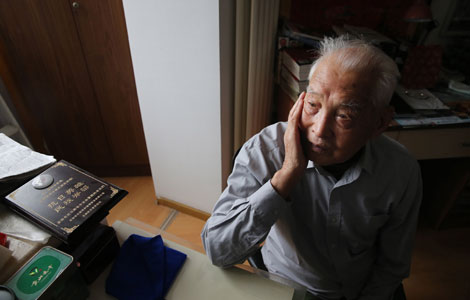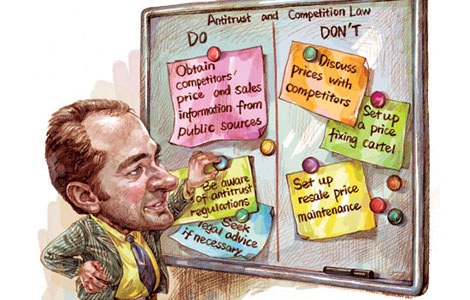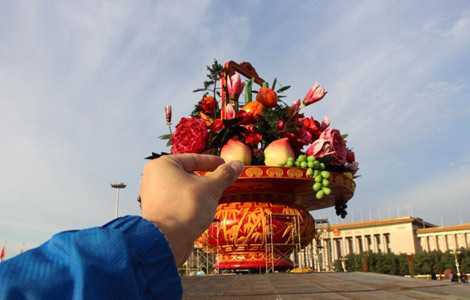Fighting Beijing's traffic blues
Updated: 2013-09-26 07:59
By Murad Qureshi (China Daily)
|
|||||||||||
Not long ago Beijing was known, among other things, for its bicycles, made even more popular across the world by the Katie Melua song: There are nine million bicycles in Beijing. The bicycles, however, didn't pose a problem for Chinese policymakers, the rising number of automobiles does. If reports are to be believed, the total number of motor vehicles in Beijing looks set to reach 6 million by 2015.
As one of China's most populous cities, Beijing is continuing to grow with an increasing number of its residents hitting the road. China and its leaders are well aware that the rapid industrialization, which has transformed the fabric of the country, has also led to worsening air pollution and traffic congestion. These are not problems that a global metropolis like Beijing can ignore.
I was in Beijing for the very successful 2008 Olympic Games, after which I traveled to Shenzhen in Guangdong province to attend the Urban Transportation Management Forum, organized by the city's government. In Shenzhen, I talked with the city's planning bureau officials about the experience of imposing congestion charge in London.
At the same time I realized that Beijing could do with a congestion charge as well, for it would not only reduce congestion but also improve the city's air quality. The short-term, but successful, measures taken during the Olympics prove that such a measure could work even greater wonders.
Certainly the clear blue skies at the end of the Beijing Olympics were impressive, especially after many had voiced concern that pollution could harm athletes' performance and health.
But it is important that sustainable long-term measures to curb traffic jams and pollution are implemented to allow China to continue to grow and for its people to benefit from the increased prosperity of recent decades. To allay rising public concern, Beijing authorities have taken a number of measures, including introducing tough new emission standards for new vehicles similar to the Euro V in Europe.
In London, like many global cities, we too have struggled to find the right balance between economic growth and the environment to improve public health, reduce congestion and create a smart, sustainable city that responds to the needs of its residents. The West certainly does not have all the answers and it would be foolish to pretend otherwise. But there are lessons that can be learned from our experience with London's congestion charge.
The debate among drivers, academics and government officials going on in Beijing are very similar to the debate in London before the congestion charge was introduced. Ten years on London remains a global player in commerce and business despite concerns that the move would put off international investment.
The charge has not only helped check congestion and pollution, but also the resultant revenue has been invested to improve London's transport infrastructure independent of the central government's assistance. In 2009-10, the total revenue collected was 148 million pounds. The benefits of the money the congestion charge raises can be seen in the development of London's orbital railway, "London Overground", which has eased congestion on many of the city's underground subway routes. The move has also convinced many Londoners to use public transport with a 6 percent increase in bus passengers during charging hours. The connection between the charge and transport spending has played a critical role in convincing Londoners of the need for the measure.
The geography of Beijing, with its five ring roads, seems suited for congestion charge. A congestion charge zone could be introduced within the Second or the Third Ring Road at the beginning, and then extended outward depending on the success of the scheme and public demand.
As in London, in order to win public support, the funds raised from the congestion charge would have to be spent on improving the public transport system, and some exemptions or at least a discount might have to be granted to residents within the charge zone. Nevertheless, the scheme could be put into operation quickly using simple technology like close circuit TV cameras at the entry points of the ring roads serving as database of car license plates.
I look forward to visiting Beijing again and seeing the city's authorities introduce congestion charge, or at least a variant form of the measure, to improve the life quality of the city's residents. This should be the icing on the cake - the results of the huge investment to improve public transportation - and would be consistent with the Chinese authorities' focus on people-centered and Scientific Outlook on Development.
The author is the chair of the London Assembly Environment Committee.
(China Daily 09/26/2013 page9)
Related Stories
Beijing remains clogged with traffic jams on Car Free Day 2013-09-23 10:54
Beijing suffers from heavy traffic ahead of festival 2013-09-18 14:59
Traffic about-face seeks to ease congestion on Beijing streets 2013-09-13 07:13
Beijing braces for heavy September traffic 2013-08-28 16:50
Today's Top News
UN resolution on Syria's chemical weapons urged
Death toll rises to 328 in SW Pakistan's quake
China, UK set to resume high-level dialogue
China reduces market intervention
Xi promotes 'mass line' campaign
China gaining military drones' share
Youth short on safe sex awareness
Station's priorities outlined
Hot Topics
Lunar probe , China growth forecasts, Emission rules get tougher, China seen through 'colored lens', International board,
Editor's Picks

|

|

|

|

|

|





